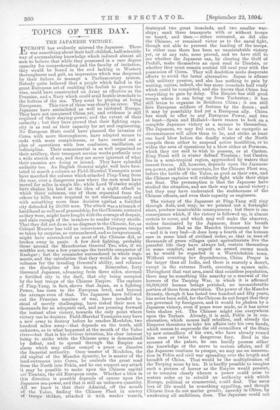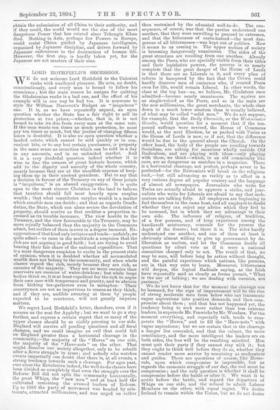TOPICS OF THE DAY.
THE JAPANESE VICTORY. EUROPE has evidently misread the Japanese. There was something about their half- childish, half-scientific way of accumulating knowledge which induced almost all men to believe that while they possessed in a rare degree capacity for comprehending and the faculty of imitation, they would be found in the end lacking in Western thoroughness and grit, an impression which was deepened by their failure to manage a Parliamentary system. Nobody quite believed that a people which failed in the great European art of enabling the foolish to govern the wise, could have constructed an Army as effective as the Prussian, and a Navy which could send hostile ironclads to the bottom of the sea. They must be playing at being Europeans. This view of them was clearly an error. The Japanese have assimilated as well as imitated Europe. They have not conquered China yet, and evidence is still required of their staying-power, and the extent of their audacity ; but they have proved that their fighting capa- city is as real as their capacity for art and engineering. No European State could have planned the invasion of Corea with more thoroughness, have adapted means to ends with more completeness, or have carried out a plan of operations with less confusion, vacillation, or indiscipline. Their commissariat is as well organised as their artillery, their transport service works perfectly over a wide stretch of sea, and they are never ignorant of what their enemies are doing or intend. They have splendid audacity too. An English General might well have hesi- tated to march a column as Field-Marshal Yamagata must have marched the column which attacked Ping-Yang from the rear, over a dangerous pass where the men must have moved for miles in single file ; while Lord Wolseley might have shaken his head at the idea of a night attack in which three columns, one of them separated from the others by hills, were required to act simultaneously and with something more than decision agaiast a fortified city defended by 20,000 men. The attack was a triumph of hardihood as well as of generalship, for the Chinese, cornered as they were, might have fought with the courage of despair, and slain enough of the invaders to render victory sterile. That they did not do so is no disgrace to the Chinese, for, as Colonel Maurice has told an interviewer, European troops so taken by surprise, so outnumbered, and so inexperienced, might have surrendered as most of the Chinese did, or broken away in panic. A few died fighting, probably those around the Manchurian General Tao, who, if we mistake not, was a few years ago the terrible conqueror of Kashgar ; but the remainder surrendered in whole regi- ments, and the calculation that they would do so speaks volumes for the invading General's ability, and reliance on the discipline of his troops. Remember, forty thousand Japanese, advancing from three sides, stormed a fortified city in the dark, that city being occupied by the best troops of the Chinese Empire. The capture of Ping-Yang, in facb, shows that Japan, as a fighting Power, has risen to the European level, and beyond the average even of that. The Japanese have followed out the Prussian maxims of war, have invaded in- stead of merely challenging, have risked their men in thousands for an adequate end, and are pressing forward the instant after victory, towards the only point where victory can be decisive. Field-Marshal Yamagata may have a new army to destroy before he reaches Moukden, two hundred miles away—that depends on the truth, still unknown, as to what happened at the mouth of the Yaloo river—but that is his obvious intention, his clear interest being to strike while the Chinese army is demoralised by defeat, and to spread through the Empire an alarm which may either compel a peace or dissolve the Imperial authority. Once .master of Moukden, the old capital of the Manchu dynasty, he is master of the land-entrances into Corea, he controls the great road from the North into Pekin, and he can support any attack it may be possible to make upon the Chinese capital via Tientsin, the old European route. Whether a blow in this direction is possible depends of course upon the Japanese sea-power, and that is still an unknown quantity. All we know is that their Admiral, off the mouth of the Yaloo, finding the Chinese Fleet in convoy of troops thither, attacked it with weaker vessels, destroyed two great ironclads, and two smaller war- ships ; sunk three transports with or without troops on board, and then — either retreated, as did also the Chinese, or remained victor as to the naval fight,. though not able to prevent the landing of the troops.. In either case there has been no unmistakable victory yet, or at any rate, none proved, and we have still to see whether the Japanese can, by clearing the Gulf of Pechili, make themselves an open road to Tientsin, or whether they must remain content till next year with the possession of Corea. They will doubtless make desperate efforts to avoid the latter alternative. Japan is aflame with military passion, and she has nothing to gain by waiting, unless, indeed, she has more ironclads half ready which could be completed, and she knows that China has everything to gain by delay. The Empire has still good troops whom it can bring up from Turkestan ; it has- still levies to organise in Southern China ; it can still hire European soldiers of fortune by the dozen ; and it may by possibility find yet a European ally. China has much to offer to any European Power, and two at least—Spain and Holland—have reason to look on a. complete Japanese victory as a menace to themselves. The Japanese, we may feel sure, will be as energetic as circumstances will allow them to be, and strike at least one hard blow before the deadly winter of the North. compels them either to suspend active hostilities, or to widen the area of operations by a blow either at Formosa, which they are said to wish to possess, or at Canton. King Frost will in winter defend. Tientsin ; but Canton lies in a semi-tropical region, approached by waters that cannot freeze. All, however, depends upon the Japanese sea-power, and this is uncertain, for the Chinese Fleet was, before the battle off the Yaloo, as good as their own, and the Chinese captains will evidently fight while their ships can float. The presumption is that the Japanese have studied the situation, and see their way to a naval victory ; but they may have underrated the stubborness of the Chinese officers, and even their capacity as engineers.
The victory of the Japanese at Ping-Yang will ring through Asia, and may, as we pointed out a fortnight since, produce incalculable consequences ; but there is one consequence which, if the victory is followed up, is almost certain to occur, and which may well make the observer, unless fascinated by the Japanese, draw his breath with horror. Bad as the Manchu Government may be —and it is very bad—it does keep a fourth of the human race in some kind of civilised order, so that in tens of thousands of green villages quiet agriculturists live the peaceful life they have always led, sustain themselves in some comfort, and regard an armed enemy much as he would be regarded in a Warwickshire town. Without counting her dependencies, China Proper is. far larger than all India, and there is scarcely a desert, except in the extreme North, covering a square mile. Throughout that vast area, amid that countless population, there may be something like anarchy or a renewal of the horrors of the Taeping War, in which it is affirmed 30,000,000 human beings perished, no inconsiderable portion of them from starvation. The power of the Manchu dynasty, though it has lasted two hundred and fifty years, has never been solid, for the Chinese do not forget that they are governed by foreigners, and it would be ()shaken by a Japanese victory, even if peace were made, as it has never been shaken yet. The Chinese might rise everywhere upon the Tartars. Already, it is said, Pekin is in con- sternation, which means half rebellion, and already the Emperor threatens to take his affairs into his own hands, which means to supersede the old councillors of the State by new councillors of his own, who have already roused him once or twice to dangerous fury. Bred in the recesses of the palace, he can hardly possess either the knowledge or the nerve to restore affairs, and if the Japanese continue to prosper, we may see an insurrec- tion in Pekin and civil war spreading over the length and breadth of China. That would be the multiplication of the Taeping scene by ten. It is hardly possible to imagine such a picture of horror as the Empire would present, or to conceive clearly whence a power could arise to restore order or to rebuild an authority with which Europe, political or commercial, could deal. The mere loss of life would be something appalling, and though Chinese lives do not matter greatly, anarchy in China, by awakening all ambitions, does. The Japanese could not obtain the submission of all China to their authority, and if they could, the world would see the rise of the most dangerous Power that has existed since Tchengis Khan died. Nothing in Asia, perhaps few Powers in Europe, could resist China guided by Japanese intelligence, organised by Japanese discipline, and driven forward by Japanese callousness to the destruction of human life. However, the first step is hardly taken yet, for the Japanese are not masters of their seas.



































 Previous page
Previous page